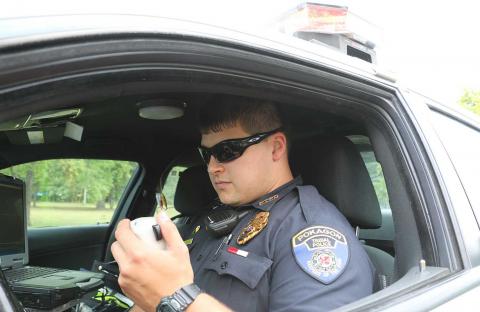WASHINGTON – U.S. Senator Cortez Masto (D-Nev.) and Representative Ruben Gallego (D-Ariz.) led a bipartisan effort to introduce bicameral legislation today that would strengthen Tribal law enforcement and increase public safety in Indian Country.

Introduced with the support of Reps. Tom Cole (R-Okla.), Sharice Davids (D-Kansas), and Dan Newhouse (R-Wash.), the Bridging Agency Data Gaps & Ensuring Safety (BADGES) for Native Communities Act would address federal inefficiencies that hurt Bureau of Indian Affairs law enforcement recruitment and retention. The BADGES Act would also increase the effectiveness of federal missing persons resources, and give Tribes and states additional resources to combat the crisis of missing and murdered Indigenous women and girls.
The BADGES Act is part of a comprehensive group of bills Cortez Masto has championed in the Senate to support Native Americans. She led passage of the bipartisan Not Invisible Act and Savanna’s Act to help address the epidemic of missing, murdered, and trafficked Indigenous women and has repeatedly advocated for additional federal funding to help Tribal communities combat violence.
“For too long, Indian Country has experienced barriers to justice because law enforcement agencies don’t have what they need,” Cortez Masto said in a statement. “That’s unacceptable, and this bill will help support law enforcement and make sure that crimes can be prosecuted and offenders brought to justice.”
The federal government has failed to provide Indian Country the resources needed to ensure public safety and support Tribal law enforcement agencies, Gallego said in a statement. “In the aftermath of the Oklahoma v. Castro-Huerta decision, finding solutions that support Tribal justice systems is more important than ever.”
Tribal members suffer the consequences of inadequate law enforcement staffing, resources and coordination among agencies “far too often,” according to Rep. Cole, co-chair of the Congressional Native American Caucus and member of the Chickasaw Nation of Oklahoma.
“I am proud to join my colleagues in reintroducing this legislation that addresses these barriers and aims to make Native American communities safer by streamlining federal criminal database coordination and collecting essential information relating to law enforcement needs.”
Rep. Davids, a member of the Ho Chunk Nation and co-chair of the Native American Caucus, said the BADGES Act would help remove barriers that stand in the way of addressing violence against tribal communities. “Improving coordination between federal, state, and tribal law enforcement agencies is vital to addressing critical data gaps and increasing public safety of all tribal populations.”
The BADGES for Native Communities Act includes provisions to do the following:
- Increase Tribal access to the National Missing and Unidentified Persons System (NamUs) by requiring Tribal facilitators to conduct ongoing Tribal outreach and serve as a point of contact for Tribes and law enforcement agencies, as well as conduct training and information gathering to improve the resolution of missing persons cases.
- Require a report on Tribal law enforcement needs, including staffing, replacement and repairs for corrections facilities, infrastructure and capital for tribal police and court facilities, and emergency communication technology.
- Allow the Bureau of Indian Affairs (BIA) to conduct its own background checks for law enforcement officer applicants in order to improve officer recruitment.
- Establish grant program to support states, Tribes, and Tribal organizations in the coordination of efforts related to missing and murdered persons cases and sexual assault cases.
- Evaluate federal law enforcement evidence collection, handling, and processing crucial to securing conviction of violent offenders.
- Ensure BIA officers and Tribal police have access to culturally appropriate mental health and wellness programs.
The legislation is endorsed by the National Indigenous Women’s Resource Center, Coalition to Stop Violence Against Native Women, the Seattle Indian Health Board, Amnesty International, National Council of Urban Indian Health, and National Congress of American Indians, according to a statement from Cortez Masto’s office.
More Stories Like This
Chickasaw Lighthorse Police Officer named Indian Country Law Enforcement Officer of the YearIndian Gaming Association Rallies Broad Coalition Against Sports Event Contracts It Calls Illegal Threat to Tribal Sovereignty
Navajo Resources and Development Committee Issues Notice on Livestock Inspection Requirements
American Prairie, Tribal Coalition Files Protest Over Rescinded Grazing Rights
Northern Cheyenne Push Back Against Trump Administration’s Effort to Alter Little Bighorn History
Help us defend tribal sovereignty.
At Native News Online, our mission is rooted in telling the stories that strengthen sovereignty and uplift Indigenous voices — not just at year’s end, but every single day.
Because of your generosity last year, we were able to keep our reporters on the ground in tribal communities, at national gatherings and in the halls of Congress — covering the issues that matter most to Indian Country: sovereignty, culture, education, health and economic opportunity.
That support sustained us through a tough year in 2025. Now, as we look to the year ahead, we need your help right now to ensure warrior journalism remains strong — reporting that defends tribal sovereignty, amplifies Native truth, and holds power accountable.
 The stakes couldn't be higher. Your support keeps Native voices heard, Native stories told and Native sovereignty defended.
The stakes couldn't be higher. Your support keeps Native voices heard, Native stories told and Native sovereignty defended.
Stand with Warrior Journalism today.
Levi Rickert (Potawatomi), Editor & Publisher


